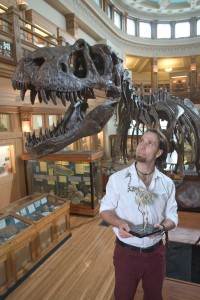
By Laurie Devine
Dino-chicken to hatch
“God creates dinosaurs. God destroys dinosaurs. God creates man. Man destroys God. Man creates dinosaurs…” So said Jeff Goldblum in the 1993 film Jurassic Park. His quip, at least the last part of it, might be coming true. From Discover magazine and the New Scientist, to the Globe and Mail and the Telegraph, there’s been a stampede of media interest in the new book How to Build a Dinosaur. Authors Jack Horner, the scientist who advised Steven Spielberg on Jurassic Park, and New York Times deputy science editor James Gorman shine the spotlight on the research of McGill paleontologist Hans Larsson. With Horner’s support and encouragement, Larsson is using reverse genetic engineering to “awaken the dinosaur within” a developing chicken embryo. Larsson believes that a chicken could not only be altered to grow a tail, but dino-style teeth and clawed wings as well – and it might even happen in the next five years.
Don’t fear the darknet
From March 13-22, close to 2,000 bands hoped to make a splash at the 23rd annual South by Southwest (SXSW) Music and Media Conference in Austin, Texas – but perhaps the biggest buzz revolved around the debate over how to license peer-to-peer (P2P) sharing of music files. P2P sharing is widely blamed for the music industry’s revenue losses, and has caused insiders to rethink how music is distributed, consumed and bought. Billboard magazine and the Chicago Tribune covered a SXSW digital music panel titled “Is Collective Licensing for P-2-P File Sharing a Future Source of Income for the Music Industry?” in which Sandy Pearlman, Dean’s Chair in Music at McGill and the legendary producer of albums by the Clash and Blue Öyster Cult, and entertainment lawyer Dina LaPolt described the “darknet,” where “a generation that grew up knowing only about a world of instant gratification and endless choice” shares information and goods in a closed virtual market that can’t be regulated or monitored. “The ‘darknet’ is here,” said LaPolt, “with networking in corners of the Net where people can hide what they’re doing.” The panelists proposed solutions that ranged from compensating rights-holders with a cut of Internet access fees to punitively increasing the access fees of users who violate copyright.
Tragedy sparks helicopter and helmet debates
As a longtime advocate for ski helmets, Dr. Tarek Razek, head of the trauma team at the McGill University Health Centre, was asked to comment on Natasha Richardson’s final hours in the international media flurry following the actor’s death. Richardson died after falling on a Mont Tremblant ski hill, causing questions about whether her head injury received timely attention – and renewing debate about the need for a medical helicopter to quickly transport accident victims to Montreal trauma centres. “If you have a ski crash at Mont Tremblant or in Sutton, I cannot get you to my centre fast enough to have those reductions in mortality,” Dr. Razek told the Toronto Star. “I just can’t. Because we don’t have the mechanisms and the systems in this region to get you there. So wear a helmet when you ski, because you’re not going to come to me.” Quebec has been considering making helmets mandatory on ski slopes and Richardson’s death may be the added push to move that ahead.
